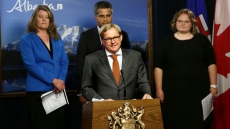WARSAW, Poland — Canada is sending hundreds of troops to Latvia for the long haul.
Prime Minister Justin Trudeau announced at the NATO leaders' summit in Poland on Friday that Canada will take command of a 1,000-strong multinational force in Latvia, as the alliance beefs up its presence in the Baltics and Poland in response to recent Russian actions.
Speaking on the sidelines of the summit, defence chief Gen. Jonathan Vance revealed that Canada will send about 450 soldiers along with armoured vehicles to the Baltic state as part of an "enduring" NATO presence in Eastern Europe.
The Canadians will form the "nucleus" of a battlegroup in Latvia, Vance said, that with the addition of forces from other allies, is expected to grow to about 1,000 troops. Germany, the United States and Britain are leading similar forces in Lithuania, Poland and Estonia.
Allies are expected to begin announcing contributions at a conference next week, while officials indicated the first Canadian troops could begin arriving in Latvia early next year. Vance couldn't say how long they would stay.
NATO Secretary General Jens Stoltenberg "has been clear this is an open-ended commitment," Vance said. "And so Canada has committed to that. We'll take it as it comes. But it is intended to be enduring."
There had already been fears NATO and Russia are on the brink of a new Cold War, if they aren't already in one. The lack of any clear timetable for when Canadian troops will come home from Eastern Europe may well add to those comparisons.

In addition to the troops, Canada will deploy up to six CF-18s to Europe on an occasional basis to help patrol allied airspace. It will also continue sending naval frigates to the region, as it has done since April 2014.
The combined efforts will bring the number of Canadian military personnel in Eastern Europe at any given time up to a maximum of 800, which the government says is Canada's largest sustained military deployment to the continent in over a decade.
Appearing with Vance, Defence Minister Harjit Sajjan pushed back on the Cold War comparisons.
"This is about sending a right message of cohesion within NATO," he said, "giving confidence to member states, and showing how important deterrence is so we can get back to a responsible dialogue."
Speaking to reporters earlier in the day, Stoltenberg said alliance members "don't want a new Cold War. The Cold War is history and it should remain history."
However, the NATO chief also said the world has seen a more assertive Russia that is willing to use military force, as exemplified by its annexations of Crimea and support for separatists in Ukraine. He said that is why the deployment of allied forces into Eastern Europe is necessary.
"They will send a clear message that an attack on one ally will be an attack on the whole alliance," Stoltenberg said. "I believe this approach, with defence and dialogue, is the only viable long-term approach to Russia."

Eastern Europe allies had been asking NATO to bolster its presence in the region as a deterrent against Russia trying to destabilize them in the same way it did Ukraine. That includes crossing into their territory, inciting Russian speakers within their borders and cyber attacks.
Russia has denied any such intentions, and instead has accused NATO of instigating the current standoff by expanding into former Soviet territory and trying to undermine its sphere of influence. It has also warned against any military build-up on its borders.


